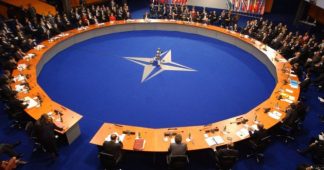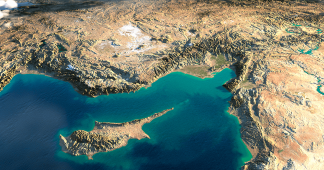By Dr. William Mallinson
19 May 2021
When the Soviet Union collapsed, and the Warsaw Pact died, there was much speculation that NATO would consider itself redundant and either disappear or at least transmogrify into a less aggressive body.
Failing that, Moscow at least felt assured that NATO would not include Germany, let alone expand eastwards. Even the NATO REVIEW, NATO’s PR organ, wrote self-apologetically twenty-five years after the fall of the Berlin wall: ‘Thus, the debate about the enlargement of NATO evolved solely in the context of German reunification. In these negotiations Bonn and Washington managed to allay Soviet reservations about a reunited Germany remaining in NATO. This was achieved by generous financial aid, and by the “2+4 Treaty” ruling out the stationing of foreign NATO forces on the territory of the former East Germany. However, it was also achieved through countless personal conversations in which Gorbachev and other Soviet leaders were assured that the West would not take advantage of the Soviet Union’s weakness and willingness to withdraw militarily from Central and Eastern Europe.’[1]
Whatever the polemics about Russia’s claim that NATO broke its promises, the facts of what happened following the fall of the Berlin wall and the negotiations about German re-unification strongly demonstrate that Moscow felt cheated and that the NATO business and military machine, driven by a jingoistic Cold War Britain, a selfish US military-industrial-congressional complex and an atavistic Russia-hating Poland, saw an opportunity to become a world policeman.
This helps to explain why, in contrast to Berlin, NATO decided to keep Nicosia as the world’s last divided city. For Cyprus is in fact NATO’s southernmost point, de facto. And to have resolved Cyprus’ problem by heeding UN resolutions and getting rid of all foreign forces and re-unifying the country would have meant that NATO would have ‘lost’ Cyprus: hardly helpful to the idea of making NATO the world policeman. Let us look a little more closely at the history behind this.
Following the Suez debâcle in 1956, Britain had already moved its Middle East Headquarters from Aden to Cyprus, while the US was taking over from the UK and France in the Middle East. Although, to some extent under US pressure, Britain was forced to bring Makarios out of exile and begin negotiating with Greece and Turkey to give up its colony, the US decided on a NATO solution. It would not do to have a truly sovereign Cyprus, but only one which accepted the existence of the Sovereign Base Areas (SBAs) as part and parcel of any settlement; and so it has remained, whatever the sophistic semantics about a bi-zonal settlement and a double-headed government. The set of twisted and oft-contradictory treaties that have bedevilled the island since 1960 are still afflicting the part-occupied island which has been a de facto NATO base since 1949. Let us look at some more history.
When Cyprus obtained its qualified independence in 1960, Greece and Turkey had already signed, on 11 February 1959, a so called ‘Gentlemen’s Agreement’, agreeing that they would support Cyprus’ entry into NATO.[2] This was however mere posture diplomacy, since Britain – and the US – did not trust Cyprus, given the strength of the Progressive Party of Working People (AKEL), and the latter’s links to Moscow. The Ministry of Defence (MOD) wrote: ‘Membership of NATO might make it easier for the Republic of Cyprus and possibly for the Greeks and Turks to cause political embarrassment should the United Kingdom wish to use the bases […] for national ends outside Cyprus […] The access of the Cypriot Government to NATO plans and documents would present a serious security risk, particularly in view of the strength of the Cypriot Communist Party. […] The Chiefs of Staff, therefore, feel most strongly that, from the military point of view, it would be a grave disadvantage to admit Cyprus to NATO.’[3] In short, Cyprus was considered unreliable.
As is well known, the unworkable constitution (described as such by the Foreign Office and even by David Hannay, the Annan reunification plan’s PR man), resulted in chaos and civil strife: in January 1964, during the chaos caused by the Foreign Office’s help and encouragement to President Makarios to introduce a ‘thirteen point plan’ to solve Cyprus’ problems, British Prime Minister Douglas-Home told the Cabinet: ‘If the Turks invade or if we are seriously prevented from fulfilling our political role, we have made it quite clear that we will retire into base.’[4] Put more simply, Britain had never had any intention of upholding the Treaty of Guarantee.
In July of the same year, the Foreign Office wrote: ‘The Americans have made it quite clear that there would be no question of using the 6th Fleet to prevent any possible Turkish invasion […] We have all along made it clear to the United Nations that we could not agree to UNFICYP’s being used for the purpose of repelling external intervention, and the standing orders to our troops outside UNFYCYP are to withdraw to the sovereign base areas immediately any such intervention takes place.’[5]
It was thanks mainly to Moscow and President Makarios that in 1964 a Turkish invasion and/or the island being divided between Greece and Turkey was prevented. Such a solution would have strengthened NATO, since Cyprus would no longer exist other than as a part of NATO members Greece and Turkey. Moscow had issued the following statement: ‘The Soviet Government hereby states that if there is an armed foreign invasion of Cypriot territory, the Soviet Union will help the Republic of Cyprus to defend its freedom and independence against foreign intervention.’[6]
Privately, Britain, realising the unworkability of the 1960 treaties, was embarrassed, and wished to relieve itself of the whole problem. The following gives us the backstage truth: ‘The bases and retained sites, and their usefulness to us, depend in large measure on Greek Cypriot co-operation and at least acquiescence. A ‘Guantanamo’[7] position is out of the question. Their future therefore must depend on the extent to which we can retain Greek and/or Cypriot goodwill and counter U.S.S.R. and U.A.R. pressures. There seems little doubt, however, that in the long term, our sovereign rights in the S.B.A’s will be considered increasingly irksome by the Greek Cypriots and will be regarded as increasingly anachronistic by world public opinion.[8]
Following the Turkish invasion ten years later, Britain tried to give up its bases: ‘British strategic interests in Cyprus are now minimal. Cyprus has never figured in NATO strategy and our bases there have no direct NATO role. The strategic value of Cyprus to us has declined sharply since our virtual withdrawal from east of Suez. This will remain the case when the Suez canal has reopened.[9]
A Cabinet paper concluded: ‘Our policy should continue to be one of complete withdrawal of our military presence on Cyprus as soon as feasible. […] In the circumstances I think that we should make the Americans aware of our growing difficulty in continuing to provide a military presence in Cyprus while sustaining our main contribution to NATO. […][10]
Britain kept trying to give up the bases, but the enabler of the Turkish invasion, Henry Kissinger, did not allow Britain to give up its bases and listening posts, since that would have weakened NATO, and since Kissinger needed the bases because of the Arab-Israel dispute.[11]
Thus, by the end of 1980, in a private about-turn, Britain had completely succumbed to American pressure: ‘The benefits which we derive from the SBAs are of major significance and virtually irreplaceable. They are an essential contribution to the Anglo-American relationship. The Department have regularly considered with those concerned which circumstances in Cyprus are most conducive to our retaining unfettered use of our SBA facilities. On balance, the conclusion is that an early ‘solution’ might not help (since pressures against the SBAs might then build up), just as breakdown and return to strife would not, and that our interests are best served by continuing movement towards a solution – without the early prospect of arrival. [author’s italics][12].
And so it is today: Cyprus is a de facto NATO territory. A truly independent, sovereign and united Cyprus is anathema to the US and Britain, since such a scenario would afford Russia the hypothetical opportunity to increase its influence in the Eastern Mediterranean.
* Professor of Political Ideas and Institutions
Universitá degli Studi Guglielmo Marconi
[1] Rühle, Michael, ‘NATO enlargment and Russia: myths and realities’, NATO REVIEW, 1 July 2014.
[2] Ministry of Defence paper JP (59) 163, I January 1960, BNA DEFE 13/99/MO/5/1/5, in Mallinson, William, Cyprus, a Modern History, I.B. Tauris (now Bloomsbury), London and New York, 2005, 2009, 2012, p.49.
[3] Ibid.
[4] Memorandum by Prime Minister, 2 January 1964, BNA CAB/129/116, in ibid, Mallinson, William, p.37.
[5] British Embassy, Washington, to Foreign Office, 7 July 1964, telegram 8541, BNA FO 371/174766, file C1205/2/G, in ibid.’, Mallinson, William, p. 37.
[6] Joseph, Joseph S., Cyprus, Ethnic Conflict and International Politics, St Martin’s Press, London and New York, 1997, p. 66.
[7] In 1964, Cuba cut off supplies to the American base at Guantanamo Bay, since the US refused to return it to Cuba, as a result of which the US took measures to make it self-sufficient.
[8] Briefing paper, 18 June 1964, BNA-DO/220/170, file MED 193/105/2, part A. Mallinson,William, Kissinger and the Invasion of Cyprus, p. 127.
[9] ‘British Interests in the Eastern Mediterranean’, draft paper, 11 April 1975, BNA-FCO 46/1248, file DPI/515/1.
[10] Cabinet paper, 29 September 1976, in op. cit. Mallinson, William, Kissinger and the Invasion of Cyprus, p.134.
[11] Mallinson, William, Britain and Cyprus: Key Themes and Documents, I.B. Tauris, London and New York, 2011, and Bloomsbury, London and New York, 2020, pp. 87-121.
[12] Fergusson to Foreign Minister’s Private Secretary, minute, 8 December 1980, BNA-FCO 9/2949, file WSC/023/1, part C.











